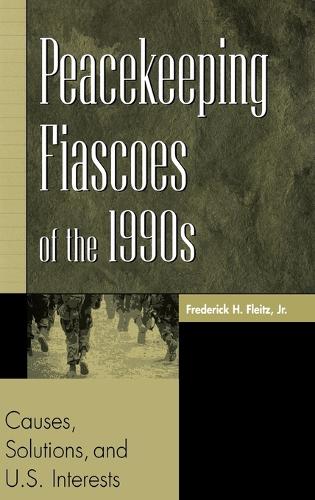
Peacekeeping Fiascoes of the 1990s: Causes, Solutions, and U.S. Interests
(Hardback)
Publishing Details
Peacekeeping Fiascoes of the 1990s: Causes, Solutions, and U.S. Interests
By (Author) Frederick H. Fleitz
Bloomsbury Publishing PLC
Praeger Publishers Inc
30th June 2002
United States
Classifications
Tertiary Education
Non Fiction
Peacekeeping operations
327.172
Physical Properties
Hardback
248
Description
Unnecessary, avoidable, and predictable, the peacekeeping disasters of the 1990s were the result of world leaders' overeagerness to employ peacekeeping troops for what in fact were belligerent purposes. Peacekeeping is a useful tool to manage international conflict and maintain truces, but it will only work in a narrow range of circumstances. "Peacekeepers" can order punitive airstrikes, depose elected leaders, destroy infrastructure, and enforce peace accords not drafted by the warring parties. They have overstepped their bounds, and "peacekeeping" is now often a euphemism for any multilateral military action. A CIA analyst who worked closely with Reagan, Bush, and Clinton administration officials on UN issues, Fleitz examines how peacekeeping works, the rash of peacekeeping failures since 1993, and whether peacekeeping can still play a role in U.S. foreign policy. It is a unique realist assessment destined to become the guide to this very important subject for U.S. policymakers, politicians, and students of international relations. UN peacekeeping disasters in the 1990s occurred because world leaders failed to recognize the rules and precedents that allowed traditional peacekeeping to succeed during the Cold War. Although failed peacekeeping operations damaged the peacekeeping concept, it can still serve as a viable tool to promote international security and promote American interests abroad if used in the right circumstances. Carefully researched and supported by over two dozen maps, charts, and photos, Fleitz boldly challenges dozens of assumptions of the foreign policy establishment about the nature of the Cold War, post-Cold War peacekeeping, and 1990s peacekeeping deployments.
Reviews
"This splendid analysis of peacekeeping in the '90s illuminates the problems encountered by the United States in its effort to utilize the new tool called "peacekeeping" to achieve traditional military goals...Fred Fleitz has a unique understanding of what can and cannot be done through peacekeeping. He understands its potential and the obstacles to its effectiveness. The United States and the United Nations have much to learn from Fleitz's careful, useful, clearly written study." Jeane J. Kirkpatrick, Leavey Professor of Government, Georgetown University
Author Bio
FREDERICK H. FLEITZ JR. is Special Assistant to the Under Secretary of State for Arms Control and International Security. His previous positions include President of the Board of Directors with the National Collegiate Conference Association, nongovernmental organization representative for the UN, and analyst of United Nations and UN peacekeeping issues for the Central Intelligence Agency. The views expressed in this book are his alone and do not necessarily represent the views of the Department of State, the Central Intelligence Agency, or the U.S. Government.
